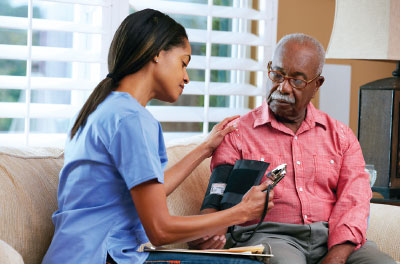Sleep Apnea Linked With Hard-to-Treat High Blood Pressure in Blacks
Abstract
As black people have a higher risk of hypertension to begin with, the added presence of sleep apnea could pose a significant health burden to this population.
Blacks with moderate or severe sleep apnea are much more likely to have resistant hypertension compared with those who do not have sleep apnea, according to a study published December 10, 2018, in the journal Circulation. Resistant hypertension—blood pressure that remains high even when a person takes three or more hypertensive medications—is the most severe category of high blood pressure.

Lead study author Dayna Johnson, Ph.D., an assistant professor of epidemiology at the Rollins School of Public Health at Emory University, said these findings illuminate a critical but underrecognized risk factor for hypertension. Obstructive sleep apnea is a common sleep disorder in which a person’s airways become transiently blocked during the night, resulting in fitful sleep and daytime drowsiness.
“Traditionally, researchers have focused on factors like diet and exercise, or comorbidities like depression, as reasons why people cannot control their hypertension,” Johnson said. “But some people remain resistant, despite improvements in their lifestyle or mood, and this study provides one reason why.”
Recent data suggest that about 75 percent of blacks will develop hypertension by age 55. Johnson’s research has shown that about 25 percent of black adults have sleep apnea.
For the current study, Johnson and colleagues assessed data from the Jackson Heart Study (JHS), a large population study investigating the causes of cardiovascular disease in blacks. A portion of the participants in the JHS were given sleep apnea tests that provided objective respiratory measures including nasal pressure. The researchers then grouped the participants into several sleep apnea categories (none, mild, moderate, or severe).
The analysis included 664 black adults (average age of 64) with hypertension. Of these participants, 38 percent had hypertension that was controlled by medication, 48 percent had uncontrolled hypertension (blood pressure remained high despite taking one or two hypertensive medications), and 14 percent had resistant hypertension (blood pressure remained high despite taking three or more hypertensive medications).
The researchers found that nearly 26 percent of these participants had moderate or severe sleep apnea, and in almost every instance, the condition had gone undiagnosed. Compared with participants with mild or no sleep apnea, those with moderate or severe sleep apnea were twice as likely to have resistant hypertension. Those with severe sleep apnea were 3.5 times as likely to have resistant hypertension.
Charles Reynolds III, M.D., the University of Pittsburgh Medical Center Endowed Professor in Geriatric Psychiatry, told Psychiatric News that mental health professionals should consider these findings important, as breathing-related sleep disorders are included in DSM-5.
“Obstructive sleep apnea has been linked with a host of medical and psychiatric problems, including depression, anxiety, and memory difficulties,” he said. “Sleep apnea also makes these conditions harder to treat.” Reynolds was chair of the DSM-5 Work Group on Sleep-Wake Disorders.
Reynolds said that psychiatrists should pay attention to sleep apnea as a possible comorbidity in their patients, especially people in at-risk groups, including those who are older, black, obese, and/or hypertensive. He noted that it is important to distinguish sleep apnea from insomnia, as sedatives can make sleep apnea worse. He suggested that psychiatrists ask spouses or other bed partners about snoring or gasping, as these are hallmarks of sleep apnea.
“Once identified, sleep apnea is very treatable, and the best approach is a coordinated effort between psychiatrists and pulmonologists,” Reynolds continued. He added that just as sleep apnea makes depression worse, untreated depression reduces the likelihood of patients getting treatment for their sleep apnea.
Johnson also stressed the importance of screening for and treating sleep apnea. “Sleep apnea can be described as a condition in which you stop breathing for a few seconds several times a night, and that’s scary when you think about it,” she said. “In our study 94 percent of the people with moderate or severe sleep apnea had never been diagnosed, and that is troubling to think about as well.”
The study was supported by grants from the National Heart, Lung, and Blood Institute (NHLBI). The Jackson Heart Study is supported and led by Jackson State University, Tougaloo College, and the University of Mississippi Medical Center, with additional support from NHLBI and the National Institute on Minority Health and Health Disparities. ■
“Association Between Sleep Apnea and Blood Pressure Control Among Blacks: Jackson Heart Sleep Study” can be accessed here.



